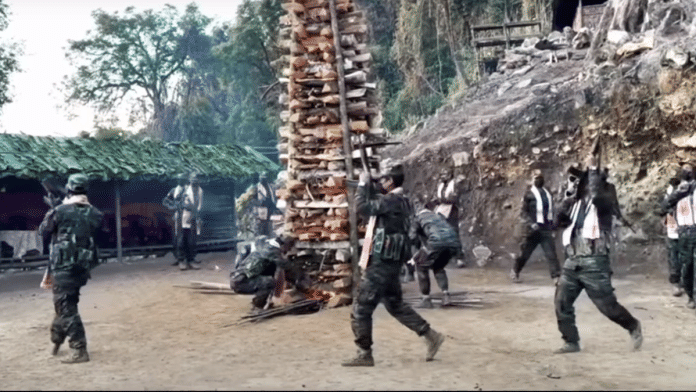New Delhi: The Wikipedia page of United Liberation Front of Asom (ULFA) identifies most leaders of the proscribed militant outfit as ‘POWs’ (Prisoners of War), but not Paresh Baruah who heads the faction opposed to peace talks.
Baruah is the leader of ULFA (Independent) which is opposed to talks with the Government of India, and is different from the pro-talks faction of ULFA led by Arabinda Rajkhowa.
Formed in 1979, ULFA was first declared an ‘unlawful organisation’ by the Ministry of Home Affairs (MHA) under the Unlawful Activities (Prevention) Act in 1990 over its stated objective—to achieve sovereignty of Assam by secession from India through armed struggle.
The ban on the outfit along with all its factions, wings and frontal organisations was extended again for a period of five years last November. The notification, as per procedure, was referred to a tribunal which found that the home ministry had sufficient cause to extend the ban.
While Paresh Baruah isn’t listed as a ‘POW’ on ULFA’s Wikipedia page, it refers to leaders of the pro-talks faction as such including Rajkhowa, Pradip Gogoi, Anup Chetia, Raju Baruah, Sashadhar Choudhury, Chitraban Hazarika, Mithinga Daimary, Bolin Das, and Pranati Deka.
Rajkhowa was arrested in Bangladesh and handed over to Indian authorities in 2009 along with Raju Baruah. He has since led the pro-talks faction which signed a tripartite ceasefire agreement with the Centre and Assam government in December 2023.
Gogoi, another leader of the pro-talks faction, was arrested in March 2021 from his residence in Guwahati for allegedly plotting to assassinate Assam CM Himanta Biswa Sarma who was the state’s finance and health minister at the time.
Chetia, a general secretary of the outfit, was extradited from Bangladesh in 2015 and is part of ULFA’s talks with the Indian government.
Choudhury and Hazarika too are members of the pro-talks faction, as is Daimary who was central publicity secretary of the ULFA before he came overground.
Bolin Das and Pranati Deka, members of ULFA’s cultural and political wings, are also part of the pro-talks faction.
On Sunday, ULFA (I) led by Paresh Baruah issued multiple purported statements claiming that three of its leaders were among 19 cadres killed in “drone attacks” carried out by the Indian Army along the India-Myanmar border. The militant outfit claimed that its eastern headquarters in Myanmar were targeted in the early hours of Sunday.
The Army denied any knowledge of or role in the alleged strikes.
Assam CM Sarma too maintained that Assam’s soil was not used to carry out any strikes on ULFA (I) camps.
Top ULFA (I) commanders ‘killed’ in drone strikes in Myanmar across India’s farthest eastern borders
Among those killed in the alleged strikes, as claimed by ULFA (I), were self-styled lieutenant general Nayan Medhi (alias Nayan Asom), self-styled brigadier Ganesh Asom and colonel Pradip Asom.
Though its armed struggle has lost relevance, it is believed that ULFA (I) still has 200-250 cadres, based in Myanmar. Paresh Baruah floated a splinter group after splitting with ULFA sometime in 2012 citing his opposition to talks with the Indian government.
He faces several cases under relevant sections of the stringent UAPA in connection with terror funding and arms smuggling, among other charges.
The National Investigation Agency (NIA) chargesheeted him along with five others last May for lobbing two grenades at an Army camp in Assam’s Tinsukia district.
In June 2024, NIA also chargesheeted Baruah and three others in another case for allegedly hurling grenades at the military station in Lichubari in Assam’s Jorhat.
“The entire conspiracy, encompassing both the attacks, had been masterminded from across the international border in Myanmar by ULFA (I) self-styled Captain, identified as Abhyeet Gogoi alias Kanak Gogoi alias Rumel Asom alias Aicheng Asom alias Aishang Asom, along with ULFA (I) chief Paresh Baruah alias Paresh Asom. Another key conspirator behind these attacks was identified as the outfit’s self-styled Brigadier, Arunudoy Dohutia alias Arunodoi Asom,” the NIA said in a statement at the time.
(Edited by Amrtansh Arora)
Also Read: Joblessness, perks of surrender, ‘frustration’ — how ULFA-I recruited over 40 youth in 8 months







Wikipedia must disclose the identity of the page moderators and content contributors. Failing which, the website should be banned in India.